在eclipse中使用maven创建springMVC项目
一、在eclipse中创建maven-archetype-webapp项目:
1.新建项目选择maven项目
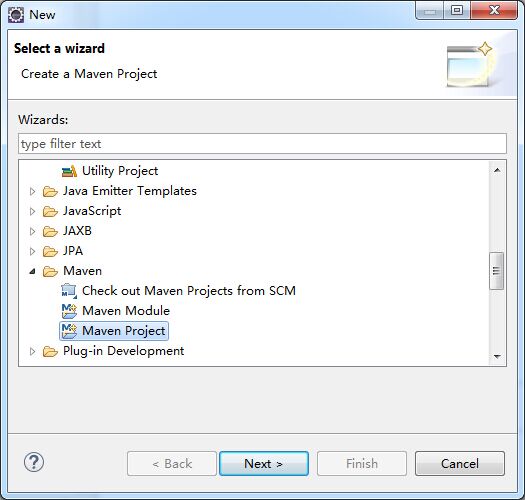
2.默认,下一步
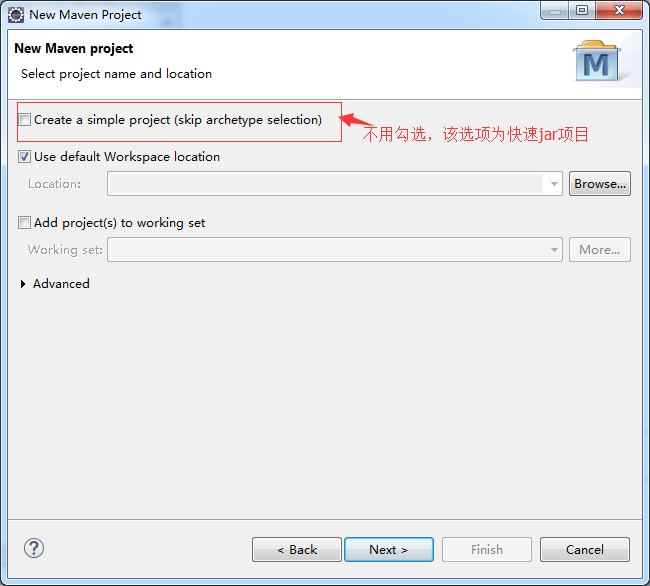
3.选择maven-archetype-webapp,其他保持默认即可
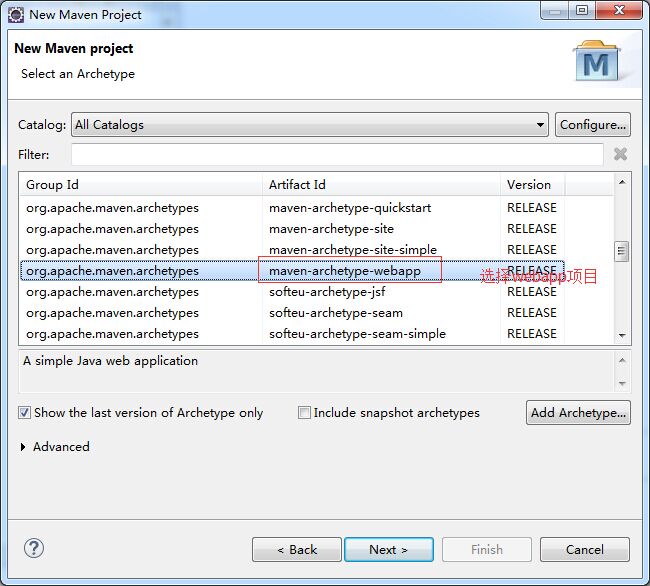
4.如下填写完成后,点击完成即可
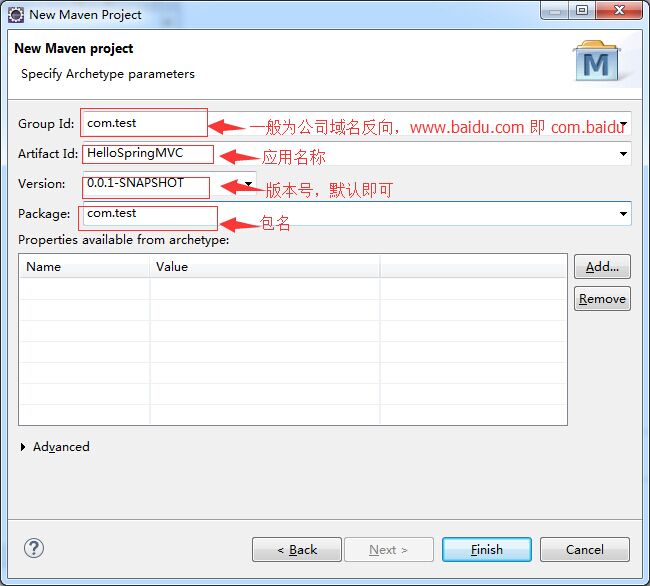
5.创建完成后的maven项目结构如下
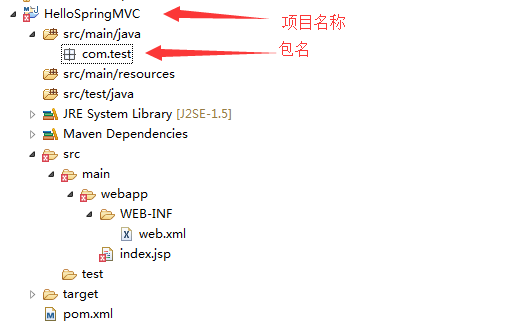
其中index.jsp报错,错误信息:Multiple annotations found at this line: – The superclass "javax.servlet.http.HttpServlet" was not found on the Java
意思是缺少servlet包,我们可以导入javax.servlet-api-3.1.0.jar包,我们可以用两种方式来处理:
1> 在pom.xml中的dependencies中加入依赖包
|
1 2 3 4 5 |
<dependency> <groupId>javax.servlet</groupId> <artifactId>javax.servlet-api</artifactId> <version>3.1.0</version> </dependency> |
2> 可以在build path中添加tomcat 库,如下
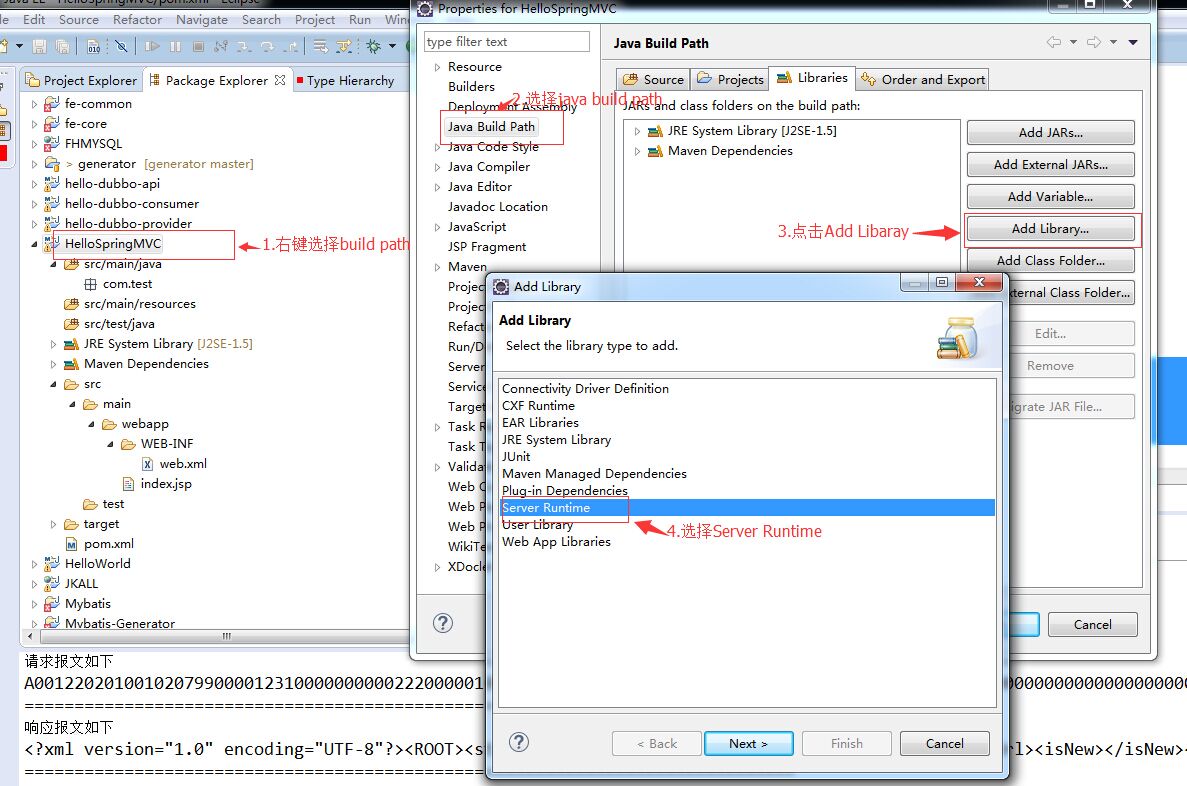
点击next出现下面界面,如下操作
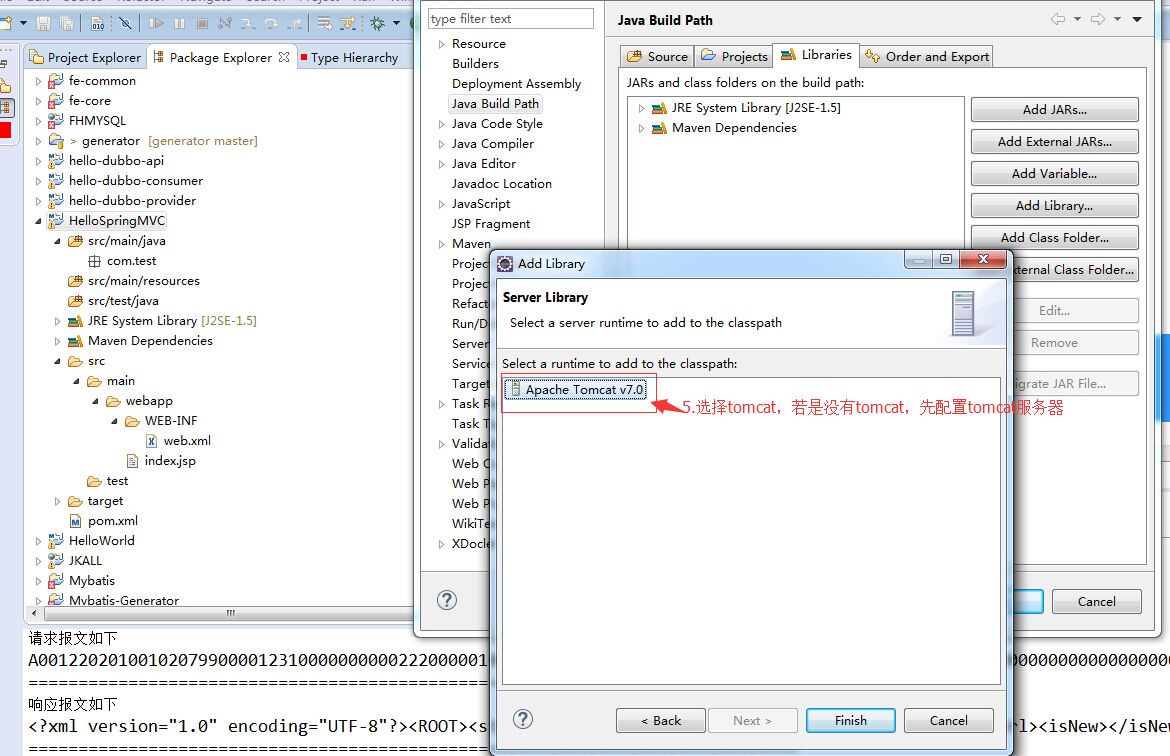
至此,一个正常的maven web项目已经建好,如下:
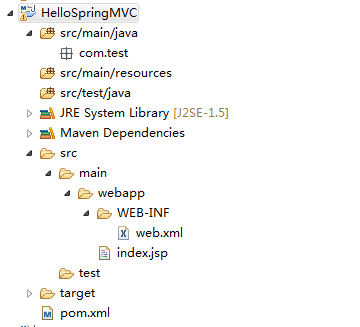
二、配置springMVC
1.在pom.xml中添加对spring的依赖
pom.xml
|
1 2 3 4 5 6 7 8 9 10 11 12 13 14 15 16 17 18 19 20 21 22 23 24 25 26 27 28 29 30 31 32 33 34 35 36 37 38 39 40 41 42 43 44 45 46 47 48 |
<project xmlns="http://maven.apache.org/POM/4.0.0" xmlns:xsi="http://www.w3.org/2001/XMLSchema-instance" xsi:schemaLocation="http://maven.apache.org/POM/4.0.0 http://maven.apache.org/maven-v4_0_0.xsd"> <modelVersion>4.0.0</modelVersion> <groupId>com.test</groupId> <artifactId>HelloSpringMVC</artifactId> <packaging>war</packaging> <version>0.0.1-SNAPSHOT</version> <name>HelloSpringMVC Maven Webapp</name> <url>http://maven.apache.org</url> <properties> <spring.version>4.1.1.RELEASE</spring.version> </properties> <dependencies> <dependency> <groupId>junit</groupId> <artifactId>junit</artifactId> <version>3.8.1</version> <scope>test</scope> </dependency> <dependency> <groupId>org.springframework</groupId> <artifactId>spring-core</artifactId> <version>${spring.version}</version> </dependency> <dependency> <groupId>org.springframework</groupId> <artifactId>spring-web</artifactId> <version>${spring.version}</version> </dependency> <dependency> <groupId>org.springframework</groupId> <artifactId>spring-webmvc</artifactId> <version>${spring.version}</version> </dependency> <dependency> <groupId>javax.servlet</groupId> <artifactId>javax.servlet-api</artifactId> <version>3.1.0</version> </dependency> </dependencies> <build> <finalName>HelloSpringMVC</finalName> </build> </project> |
保存后会下载对应的jar文件
2.编辑web.xml文件
web.xml内容
|
1 2 3 4 5 6 7 8 9 10 11 12 13 14 15 16 17 18 19 20 21 22 23 24 25 26 27 28 |
<web-app version="3.0" xmlns="http://java.sun.com/xml/ns/javaee" xmlns:xsi="http://www.w3.org/2001/XMLSchema-instance" xsi:schemaLocation="http://java.sun.com/xml/ns/javaee http://java.sun.com/xml/ns/javaee/web-app_3_0.xsd"> <display-name>Archetype Created Web Application</display-name> <servlet> <servlet-name>dispatcher</servlet-name> <servlet-class>org.springframework.web.servlet.DispatcherServlet</servlet-class> <init-param> <param-name>contextConfigLocation</param-name> <param-value>classpath:springContext.xml</param-value> </init-param> <load-on-startup>1</load-on-startup> </servlet> <servlet-mapping> <servlet-name>dispatcher</servlet-name> <url-pattern>/</url-pattern> </servlet-mapping> <context-param> <param-name>contextConfigLocation</param-name> <param-value>classpath:springContext.xml</param-value> </context-param> <listener> <listener-class>org.springframework.web.context.ContextLoaderListener</listener-class> </listener> </web-app> |
3.创建springContext.xml文件,在src/main/resources包中创建springContext.xml文件,如图:
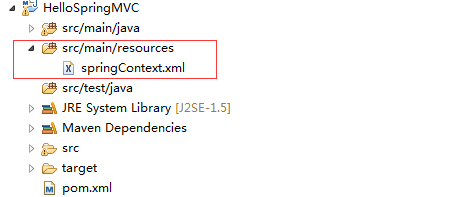
springContxt.xml内容
|
1 2 3 4 5 6 7 8 9 10 11 12 13 14 15 16 17 18 19 20 21 22 |
<?xml version="1.0" encoding="UTF-8"?> <beans xmlns="http://www.springframework.org/schema/beans" xmlns:context="http://www.springframework.org/schema/context" xmlns:xsi="http://www.w3.org/2001/XMLSchema-instance" xsi:schemaLocation=" http://www.springframework.org/schema/beans http://www.springframework.org/schema/beans/spring-beans-3.0.xsd http://www.springframework.org/schema/context http://www.springframework.org/schema/context/spring-context-3.0.xsd"> <!-- 搜索spring控件 --> <context:component-scan base-package="com.test"></context:component-scan> <!-- 视图页面配置 --> <bean class="org.springframework.web.servlet.view.InternalResourceViewResolver"> <property name="prefix"> <value>/WEB-INF/views/</value> </property> <property name="suffix"> <value>.jsp</value> </property> </bean> </beans> |
在springContext.xml中,base-package是指定spring控制器控件的包,前缀指定的是视图目录,被设置为/WEB-INF/views,即视图目录被放到WEB-INF下。后缀指定的是视图的扩展名。例如,"hellospring"视图,将被放到/WEB-INF/views/hellospring.jsp。
4. 创建Spring控制器和视图
创建HelloSpringController.java类,在src/main/java包中,如下图:
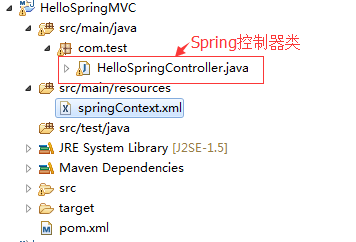
HelloSpringController.java
|
1 2 3 4 5 6 7 8 9 10 11 12 13 14 15 16 17 18 19 20 21 22 |
package com.test; import org.springframework.stereotype.Controller; import org.springframework.web.bind.annotation.RequestMapping; import org.springframework.web.bind.annotation.RequestParam; import org.springframework.web.servlet.ModelAndView; @Controller public class HelloSpringController { String message = "Welcome to Spring MVC!"; @RequestMapping("/hello") public ModelAndView showMessage(@RequestParam(value = "name", required = false, defaultValue = "Spring") String name) { ModelAndView mv = new ModelAndView("hellospring");//指定视图 //向视图中添加所要展示或使用的内容,将在页面中使用 mv.addObject("message", message); mv.addObject("name", name); return mv; } } |
在上面的代码中,@Controller注解为Spring标注前置控制器的方式,@RequestMapping注解映射web请求到具体要操作的类或者方法上面,@RequestMapping注解既可以用到类上,也可以用到方法上,在此不再详述,如有疑问,可以百度。@RequestParam注解为请求指定参数。这种方式提供了一个一致 的编程风格。
另外上述代码中ModelAndView类指定具体的视图,这里是"hellospring",由于我们在springContext.xml配置了视图的前后缀,所以在这里只需要写出视图的具体名称即可,其具体指定的就是:前缀+视图名称+后缀,即完整的视图路径/WEB-INF/views/hellospring.jsp,也就是所要展示的视图的位置。
项目首页index.jsp内容
|
1 2 3 4 5 6 7 8 9 10 11 12 13 14 15 16 17 18 |
<%@ page language="java" contentType="text/html; charset=UTF-8" pageEncoding="UTF-8"%> <!DOCTYPE html PUBLIC "-//W3C//DTD HTML 4.01 Transitional//EN" "http://www.w3.org/TR/html4/loose.dtd"> <html> <head> <meta http-equiv="Content-Type" content="text/html; charset=UTF-8"> <title>Spring 4 MVC - HelloWorld Index Page</title> </head> <body> <center> <h2>Hello World</h2> <h3> <a href="hello?name=zhangsan">点击跳转</a> </h3> </center> </body> </html> |
上述代码中,点击跳转 的链接其实就是我们HelloSpringController.java中定义的控制器的一个@RequestMapping注解方法,name=zhangsan为showMessage接受的参数。
在/WEB-INF/views/下创建hellospring.jsp视图,如图:
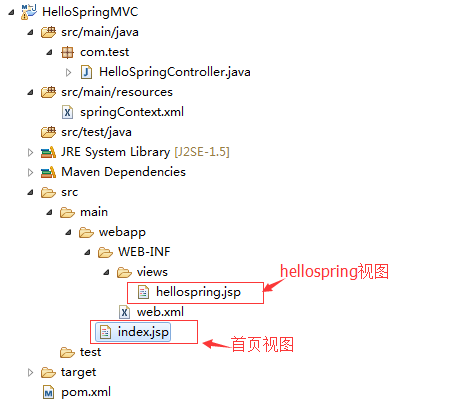
hellospring.jsp
|
1 2 3 4 5 6 7 8 9 10 11 12 13 14 15 |
<%@ page language="java" contentType="text/html; charset=UTF-8" pageEncoding="UTF-8"%> <!DOCTYPE html PUBLIC "-//W3C//DTD HTML 4.01 Transitional//EN" "http://www.w3.org/TR/html4/loose.dtd"> <html> <head> <meta http-equiv="Content-Type" content="text/html; charset=UTF-8"> <title>Spring 4 MVC -HelloWorld</title> </head> <body> <center> <h2>Hello World</h2> <h2> ${message} ${name} </h2> </center> </body> </html> |
上述代码中显示我们在HelloSpringController.java的showMessage方法中添加的两个参数message和name,如图:
好,至此我们使用maven搭建springMVC的操作已经全部完成,完成后整个项目的结构如下图:
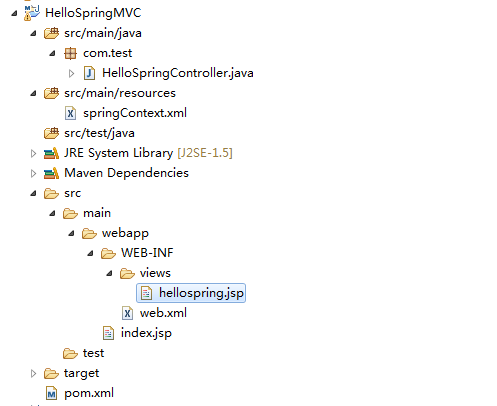
三、将项目部署到tomcat服务器运行
首页 http://localhost:8080/HelloSpringMVC/ ,其中也可以使用 http://localhost:8080/HelloSpringMVC/index.jsp 两个效果是一样的
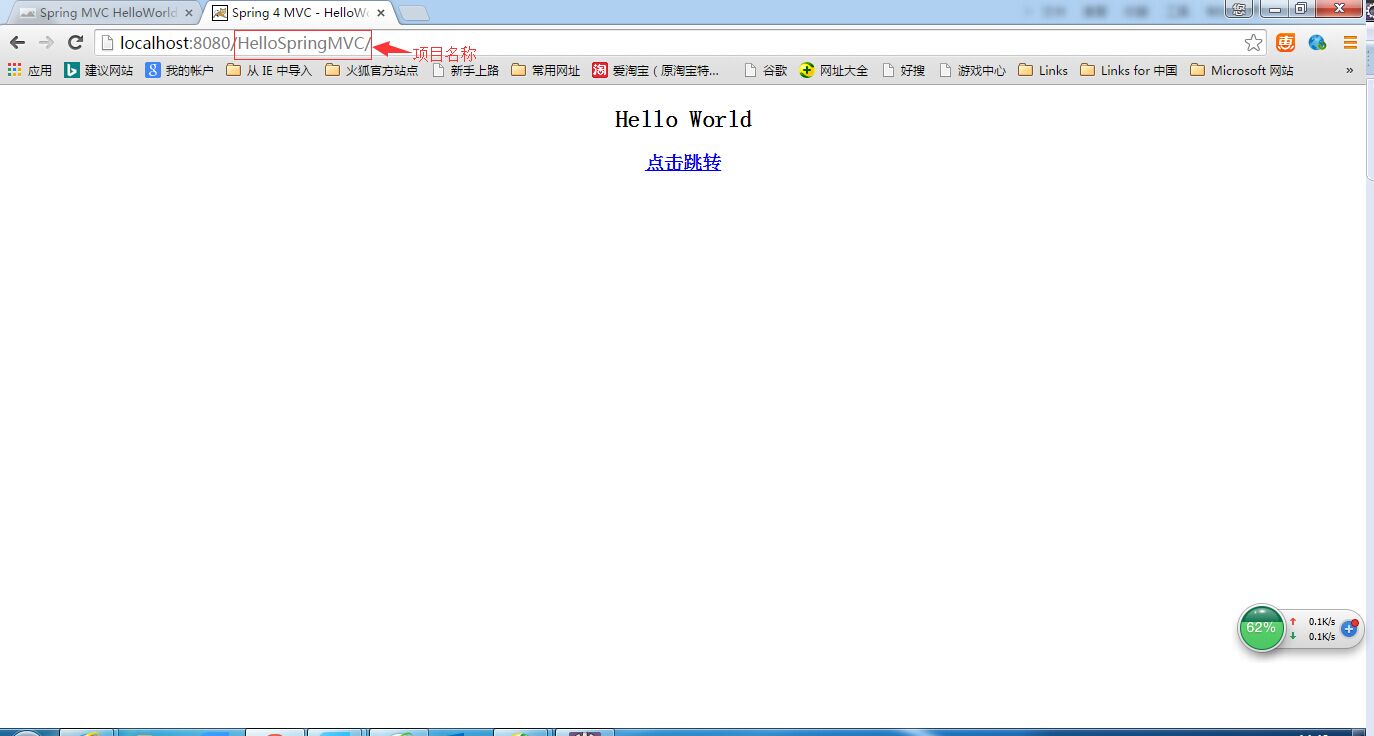
点击跳转 页
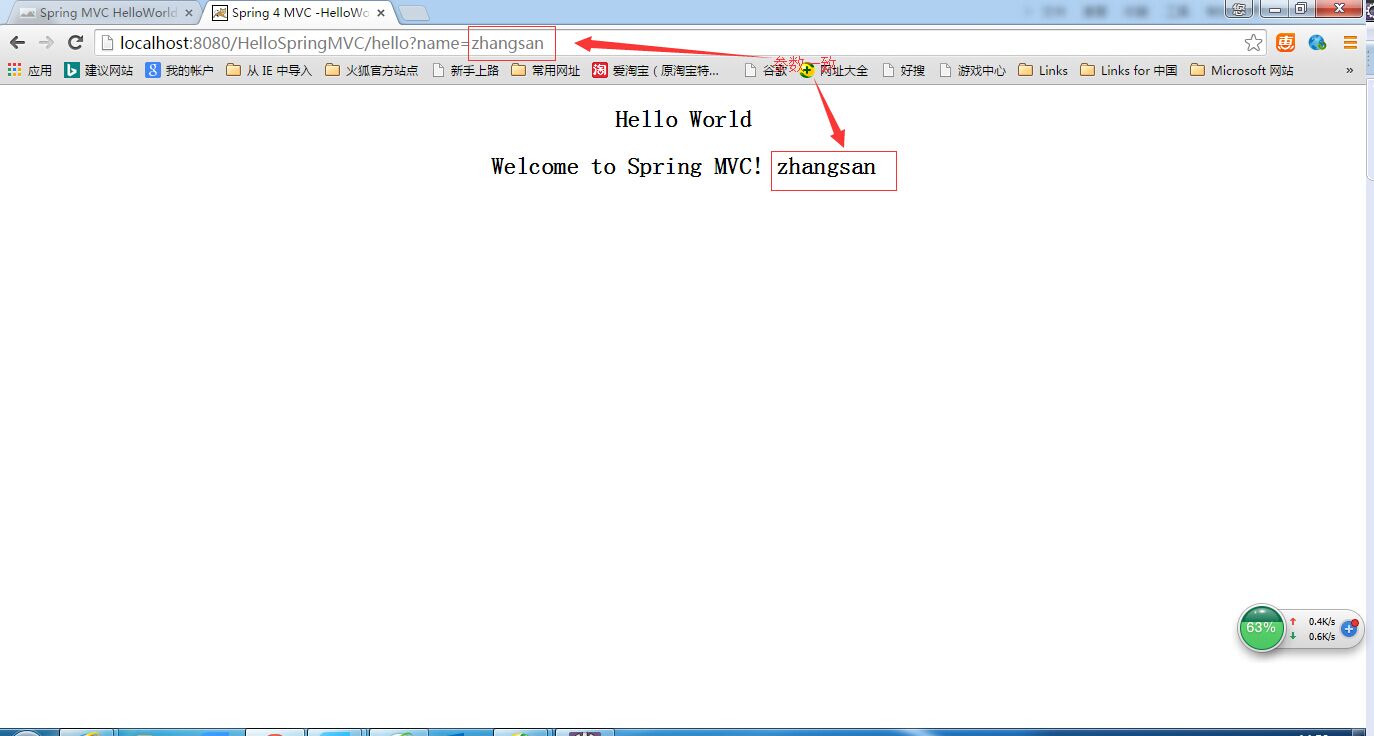
注意:若是跳转后页面直接显示${message} ${name}说明jstl表达式不起作用,我们可以在pom.xml中添加如下依赖:
|
1 2 3 4 5 6 7 8 9 10 11 |
<dependency> <groupId>javax.servlet</groupId> <artifactId>jstl</artifactId> <version>1.2</version> <scope>runtime</scope> </dependency> <dependency> <groupId>taglibs</groupId> <artifactId>standard</artifactId> <version>1.1.2</version> </dependency> |